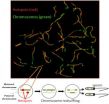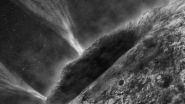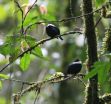(Press-News.org) Researchers have zoomed in on mouse chromosomes to map hotspots of genetic recombination — sites where DNA breaks and reforms to shuffle genes. The findings of the scientists at the National Institutes of Health and Uniformed Services University of Health Sciences (USU) have the potential to improve the detection of genes linked to disease and to help understand the root causes of genetic abnormalities. The research, published online April 3 in Nature, moves scientists one step closer to understanding how mammals evolve and respond to their environments.
In this image, hundredfold magnification of a single sperm precursor cell shows the chromosomes – in green – and the places where these chromosomes are most likely to break apart and re-form, called genetic recombination hotspots – in red. Genetic rearrangements at these hotspots have the potential to shuffle maternal and paternal chromosomes, the end results of which ensure that the genetic information in every sperm cell is unique. Source: Fatima Smagulova, Ph.D., USU, and Kevin Brick, Ph.D., NIDDK, NIH.Genetic recombination occurs at hotspots in cells that form sperm and eggs. At these sites, rearrangements ensure that the combination of genes passed on to every sperm and egg cell is unique. By studying precursors of mouse sperm cells during the early stages of genetic recombination, the scientists have created a precise, first-of-its-kind map of recombination hotspots in a multi-celled organism.
With this map, researchers also hope to pinpoint where, how and why abnormalities in the number of chromosomes can occur. Such abnormalities — for instance, the extra copy of chromosome 21 that gives rise to Down syndrome — are the leading known cause of miscarriages, congenital birth defects, and mental retardation in the United States.
"We wanted to figure out how recombination varied across the genome," said R. Daniel Camerini-Otero, M.D., Ph.D., one of the senior authors on the paper and a researcher at the NIH's National Institute of Diabetes and Digestive and Kidney Diseases (NIDDK). "Hotspots are the starting point for the process that ensures that every person is unique. These hotspots facilitate the adaptation of populations to environmental influences through evolution. Our findings will allow us to explore things like how environment and genetic background affect the recombination landscape."
"Now that we have mapped recombination hotspots genome-wide, we can actually carry out studies on the whole mouse genome. This will be very beneficial in extending our knowledge to organisms as complex as humans," said Galina Petukhova, Ph.D., assistant professor in the USU Department of Biology and one of the paper's senior authors. "Faulty recombination can lead to infertility or birth defects, and this work brings us closer to our ultimate goal of helping to prevent these health issues."
Camerini-Otero compared the map's new level of precision to the difference between being able to zoom in to see a city block to being able to zoom in to see each building on the block. "What we were looking for was resolution that was much higher than ever seen before," said Camerini-Otero. "Now that we can actually see these individual events of genetic recombination, we can begin to understand their molecular structure."
The researchers — including lead authors Fatima Smagulova, Ph.D., of USU, and Ivan V. Gregoretti, Ph.D., of NIDDK — used cutting-edge DNA sequencing technology and lots of computational power to take a snapshot of all the individual pieces of DNA that were taking part in recombination at a given moment in living cells. They then used this snapshot of short DNA pieces to draw a map of where chromosomes have an increased potential to be broken and to come back together in new ways.
Mice were used as subjects for this study because the researchers needed a population that could be created with a specific and identical genetic background. With this initial study a success, they hope to apply the same techniques to study recombination in people in the near future.
The end result is a catalog of about 10,000 hotspots and resembles a detailed map of where diversity can arise in the genome and of sites where such processes may go awry. The researchers next plan to apply what they've seen and learned with this new map to further understand chromosomal abnormalities, genetic recombination, genome stability and evolution.
INFORMATION:
The NIH's National Institute of General Medical Sciences and the March of Dimes Foundation helped fund this research through grants to Petukhova.
The NIDDK conducts and supports research in diabetes and other endocrine and metabolic diseases; digestive diseases, nutrition, and obesity; and kidney, urologic, and hematologic diseases. Spanning the full spectrum of medicine and afflicting people of all ages and ethnic groups, these diseases encompass some of the most common, severe, and disabling conditions affecting Americans. For more information about NIDDK and its programs, see www.niddk.nih.gov.
About the National Institutes of Health (NIH): NIH, the nation's medical research agency, includes 27 Institutes and Centers and is a component of the U.S. Department of Health and Human Services. NIH is the primary federal agency conducting and supporting basic, clinical, and translational medical research, and is investigating the causes, treatments, and cures for both common and rare diseases. For more information about NIH and its programs, visit www.nih.gov.
Reference: "Genome-Wide Analysis Reveals Novel Molecular Features of Mouse Recombination Hotspots," published online Sunday, April 3, 2011, in Nature (http://www.nature.com/nature/journal/vaop/ncurrent/full/nature09869.html).
NIH, USU study maps hotspots of genetic rearrangement
Findings in mice could aid understanding of how mammals genetically adapt
2011-04-06
ELSE PRESS RELEASES FROM THIS DATE:
Analysis of opioid prescription practices finds areas of concern
2011-04-06
An analysis of national prescribing patterns shows that more than half of patients who received an opioid prescription in 2009 had filled another opioid prescription within the previous 30 days. This report also suggested potential opportunities for intervention aimed at reducing abuse of prescription opioids.
Researchers from the National Institute on Drug Abuse (NIDA), a component of the National Institutes of Health, will publish results of this analysis in this week's Journal of the American Medical Association (JAMA).
"More research is needed to see if current ...
Frozen comet had a watery past, University of Arizona scientists find
2011-04-06
For the first time, scientists have found convincing evidence for the presence of liquid water in a comet, shattering the current paradigm that comets never get warm enough to melt the ice that makes up the bulk of their material.
"Current thinking suggests that it is impossible to form liquid water inside of a comet," said Dante Lauretta, an associate professor of cosmochemistry and planet formation at the UA's Lunar and Planetary Laboratory. Lauretta is the principal investigator of the UA team involved in analysis of samples returned by NASA's Stardust mission.
UA ...
Using MRI, researchers may predict which adults will develop Alzheimer's
2011-04-06
OAK BROOK, Ill. – Using MRI, researchers may be able to predict which adults with mild cognitive impairment are more likely to progress to Alzheimer's disease, according to the results of a study published online and in the June issue of Radiology.
Mild cognitive impairment (MCI) is an intermediate stage between the decline in mental abilities that occurs in normal aging and the more pronounced deterioration associated with dementia, a group of brain disorders that includes Alzheimer's disease (AD).
Individuals with MCI develop AD at a rate of 15 to 20 percent per ...
Marbella University Unveils an MBA Program to "Save Humanity and the Planet"
2011-04-06
Lies, cheat, deceit, distortion, hype, and a blind pursuit of profit have poisoned the business world. The price of this has been the destruction of the planet, its ecosystems and the alienation of humans from their soul and genuine inner needs.
Pollution, contamination, climate change, poverty, rising sea level, unemployment, financial crisis, social unrest, war, and a general lack of trust has taken over as a result.
The world needs new managers and CEOs; new MBAs
The state of humanity and the planet clearly shows: politics has failed, corporations have failed, ...
Study: Socioeconomics playing reduced role in autism diagnoses
2011-04-06
WASHINGTON, DC, April 4, 2011 — While there is an increasing equality in terms of the likelihood that children from communities and families across the socioeconomic spectrum will be diagnosed with autism, a new study finds that such factors still influence the chance of an autism diagnosis, though to a much lesser extent than they did at the height of rising prevalence.
"As knowledge has spread about autism, information is now more evenly distributed across different kinds of communities," said Peter S. Bearman, the Cole Professor of the Social Sciences at Columbia ...
New survey: 72 percent of Americans think health-care system needs major overhaul
2011-04-06
New York, NY, April 6, 2011—Seven of 10 adults think the U.S. health care system needs to be fundamentally changed or completely rebuilt, according to a Commonwealth Fund survey released today. The concerns reflect widespread experiences with access barriers, poorly coordinated care and growing costs. The survey also reveals strong support for more patient-centered care systems and innovative use of teams and information systems.
The new survey found that a large majority of U.S. adults have concerns about access, with 71 percent reporting problems gaining access to ...
Birds must choose between mating, migrating, study finds
2011-04-06
Sex or nice weather. That's the agonizing choice some birds face, according to a new University of Guelph study.
A team led by Guelph researchers discovered that for some male birds traveling to areas with lighter rainfall comes at the cost of attracting a female when they return home.
Alice Boyle, a former U of G post-doc, Prof. Ryan Norris and Prof. Chris Guglielmo, a biologist at the University of Western Ontario, examined the breeding behaviour of the white-ruffed manakin. This small Costa Rican bird is partially migratory, choosing each year whether to migrate ...
Plackers Celebrates Launch of New Kids Flossers and Interactive Kids Club with Consumer Sweepstakes
2011-04-06
Plackers, a leading brand of consumer oral care products and makers of the first disposable dental flosser, is launching Plackers Kids, its new kid-friendly dental flossers; the Plackers Kids Club, an online club for kids featuring free interactive games and activities that encourage healthy dental hygiene habits; and the Plackers Kids Club Sweepstakes, offering families the chance to win a trip for four to the popular theme park destination, Orlando, Fla. among other prizes.
The new Plackers Kids flossers are designed to engage children through a variety of fun, colorful ...
InfoTech Solutions for Business' RPAS Used by Raymond James to Create Global Network
2011-04-06
InfoTech Solutions for Business, Inc. has launched a Research Publishing Automation System (RPAS) implementation for Raymond James Limited (RJL) in Canada. RPAS automates the production, workflow and distribution processing of financial research documents and related data, increasing speed and efficiency getting financial research to market.
Raymond James now has a global research publishing platform, using a single RPAS to author and publish research from different Raymond James Financial research-producing entities. This is a breakthrough for InfoTech's design and ...
Banc De Binary's Leadership 101
2011-04-06
Alexander Moussaieff, Banc De Binary's Senior Broker, explains how the leadership problem has never been a problem in the online financial world.
This week I met with some senior Binary Option leaders to discuss the future of employment in the financial industry. Toward the end of the discussion, we discussed the problem of how to develop future leaders in light of the fact that forced restrictions in the employment market have increased competition for new jobs. Experienced heads have remained, and market conditions have made it difficult to recruit, thus restricting ...
LAST 30 PRESS RELEASES:
Reconstructing the world’s ant diversity in 3D
UMD entomologist helps bring the world’s ant diversity to life in 3D imagery
ESA’s Mars orbiters watch solar superstorm hit the Red Planet
The secret lives of catalysts: How microscopic networks power reactions
Molecular ‘catapult’ fires electrons at the limits of physics
Researcher finds evidence supporting sucrose can help manage painful procedures in infants
New study identifies key factors supporting indigenous well-being
Bureaucracy Index 2026: Business sector hit hardest
ECMWF’s portable global forecasting model OpenIFS now available for all
Yale study challenges notion that aging means decline, finds many older adults improve over time
Korean researchers enable early detection of brain disorders with a single drop of saliva!
Swipe right, but safer
Duke-NUS scientists identify more effective way to detect poultry viruses in live markets
Low-intensity treadmill exercise preconditioning mitigates post-stroke injury in mouse models
How moss helped solve a grave-robbing mystery
How much sleep do teens get? Six-seven hours.
Patients regain weight rapidly after stopping weight loss drugs – but still keep off a quarter of weight lost
GLP-1 diabetes drugs linked to reduced risk of addiction and substance-related death
Councils face industry legal threats for campaigns warning against wood burning stoves
GLP-1 medications get at the heart of addiction: study
Global trauma study highlights shared learning as interest in whole blood resurges
Almost a third of Gen Z men agree a wife should obey her husband
Trapping light on thermal photodetectors shatters speed records
New review highlights the future of tubular solid oxide fuel cells for clean energy systems
Pig farm ammonia pollution may indirectly accelerate climate warming, new study finds
Modified biochar helps compost retain nitrogen and build richer soil organic matter
First gene regulation clinical trials for epilepsy show promising results
Life-changing drug identified for children with rare epilepsy
Husker researchers collaborate to explore fear of spiders
Mayo Clinic researchers discover hidden brain map that may improve epilepsy care
[Press-News.org] NIH, USU study maps hotspots of genetic rearrangementFindings in mice could aid understanding of how mammals genetically adapt




